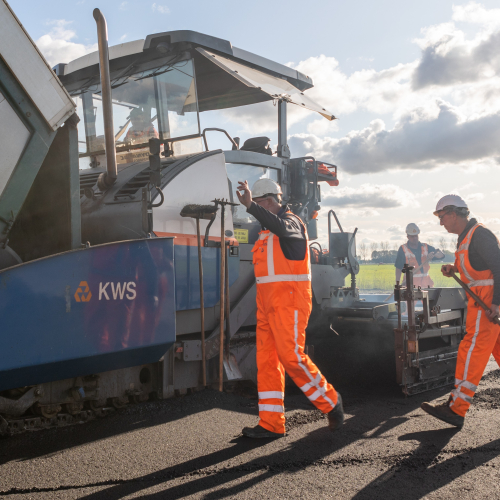Using 100% recycled asphalt at Schiphol business park reduces CO2 emissions by 75%
KWS has used its 100% recycled asphalt on a large scale for the very first time, applying it in the sub-base layer, base layer and surface layer of the asphalt road at Schiphol Trade Park in Hoofddorp, a business park development owned by Schiphol Area Development Company (SADC). The asphalt is produced in the company’s own HERA (‘Highly Ecologic Recycling Asphalt’) System, which is part of the Rotterdam asphalt plant. Following the initial pilot with 100% recycled asphalt in the surface layer in 2017, this is the next step towards fully-recycled asphalt roads. Compared to traditional asphalt construction, KWS is cutting CO₂ emissions by 75% in the production of this asphalt.

In the past few months the asphalt was applied in phases, the last part of which was completed last Friday. The ingredient used in this 100% recycled asphalt is old asphalt from the region which is put through a crusher to create a homogenous material and heated in the HERA System. By adding organic rejuvenation oil we are able to restore the flexible qualities of the bitumen so that the new road can be laid. While KWS has used 100% recycled asphalt in the sub-base layer and base layer before, using this asphalt on a large scale in the surface layer (the top layer of the road) is new. KWS is able to cut CO2 emissions by 75% during the total production of the asphalt.
Indirect heating and sustainability
The asphalt is produced through indirect heating in the HERA System, a unique international technique. Indirect heating damages the old asphalt less and results in fewer emissions of harmful materials. The HERA System operates on 100% green energy.
This sustainable KWS alternative is helping SADC achieve its goal of developing the most sustainable and innovative business park in Europe. This is a perfect fit with KWS’ own sustainability objective of achieving 100% circular infrastructure in 2040. An important cornerstone of this is to stop using primary raw materials (such as stone and sand in asphalt). Using asphalt composed completely of old asphalt enables KWS to make clear steps towards achieving this goal.